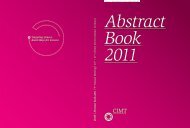Abstract Book 2010 - CIMT Annual Meeting
Abstract Book 2010 - CIMT Annual Meeting
Abstract Book 2010 - CIMT Annual Meeting
You also want an ePaper? Increase the reach of your titles
YUMPU automatically turns print PDFs into web optimized ePapers that Google loves.
020 Nielsen | Therapeutic vaccination<br />
The CDX-1307 vaccine: regulatory and clinical steps in<br />
developing a regimen<br />
Michaela Nielsen, Larry Thomas, Laura Vitale, Li-Zhen He, Venky Ramakrishna, Jennifer<br />
Green, Thomas Davis<br />
Celldex Therapeutics, Inc., Needham, Massachusetts 02494, USA<br />
56<br />
CDX-1307 is a dendritic cell (DC)-targeting cancer<br />
vaccine, consisting of a monoclonal antibody<br />
against the mannose receptor, CD206, fused to the<br />
β-chain of human chorionic gonadotropin (hCGβ).<br />
hCGβ is frequently expressed by common epithelial<br />
cancers, may facilitate cancer progression,<br />
and correlates with poor prognosis. The antibody<br />
portion of the vaccine targets it to CD206 on DCs,<br />
where the molecule is internalized and processed<br />
into peptides that are presented on the DC surface.<br />
The CDX-1307 vaccine regimen was developed in<br />
a step-wise approach. Without a suitable animal<br />
model available, the initial Phase I study was a<br />
dose-escalation with intradermal administration of<br />
CDX-1307 in patients with incurable cancer. Safety<br />
of the vaccine was established by demonstrating<br />
tolerability in cohorts of 6 patients at 0.3, 1.0, and<br />
2.5 mg respectively, given every two weeks for a<br />
total of 4 doses.<br />
Pre-clinical data and clinical experience demonstrated<br />
that inclusion of adjuvants leads to optimal<br />
immune responses. The cytokine GM-CSF, which<br />
mobilizes and activates antigen-presenting cells<br />
(APCs) and up-regulates CD206 on APCs, was thus<br />
proposed to be added to the study regimen. After a<br />
toxicology study with CDX-1307 + GM-CSF in hMRtransgenic<br />
mice showed no noteworthy adverse reactions,<br />
combination treatment with CDX-1307 and<br />
GM-CSF was approved and initiated.<br />
Further studies indicated that immune responses<br />
are significantly enhanced by toll-like receptor<br />
(TLR) agonists. Two such agents were proposed<br />
to be added to the CDX-1307 + GM-CSF regimen<br />
in additional cohorts: the TLR7/8 antagonist Resiquimod<br />
(3M) or the TLR3 antagonist Hiltonol®<br />
(Poly-ICLC). Both cohorts were approved based on<br />
previous human experience with the antagonists,<br />
which were proposed to be used in a concentration<br />
below their established maximum tolerated doses<br />
(MTD).<br />
Our pre-clinical studies showed that combining<br />
TLR agonists enhances the immune response and<br />
anti-tumor activity of cancer vaccines. Therefore,<br />
a regimen that combines GM-CSF, Resiquimod and<br />
Hiltonol® (Poly-ICLC) was proposed. This regimen<br />
was approved after review of toxicology data from<br />
a rabbit local reactogenicity study with various<br />
combinations of the three adjuvants. One particular<br />
challenge of the combination regimen is the<br />
local administration of four different agents, one<br />
of which is topically administered (Resiquimod),<br />
while the others are injected. Most rabbits that received<br />
the three adjuvant combination developed<br />
minor skin reactogenicity, with only one animal<br />
developing some slowly resolving subcutaneous<br />
edema.<br />
The clinical data demonstrated that the combination<br />
of the TLR agonists increased the frequency and<br />
severity of local reactions, but they were limited to<br />
grade 1 and 2 and resolved. In fact no dose limiting<br />
toxicities were reported, while robust anti-hCG-β<br />
humoral and T cell responses were reported. Evidence<br />
of clinical impact was observed in a subset of<br />
patients, and was noted to be associated with generation<br />
of anti-hCG-β responses. These data provide<br />
support for further evaluation of the CDX-1307<br />
vaccine regimen in patients with hCG-β-expressing<br />
tumors. A Phase II study in patients with newly diagnosed,<br />
resectable hCGβ-positive bladder cancer<br />
involving the full combination regimen has been<br />
accepted by the FDA and is pending initiation.



